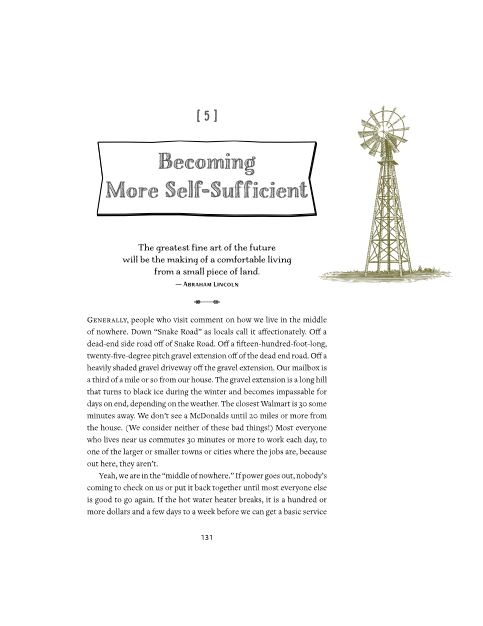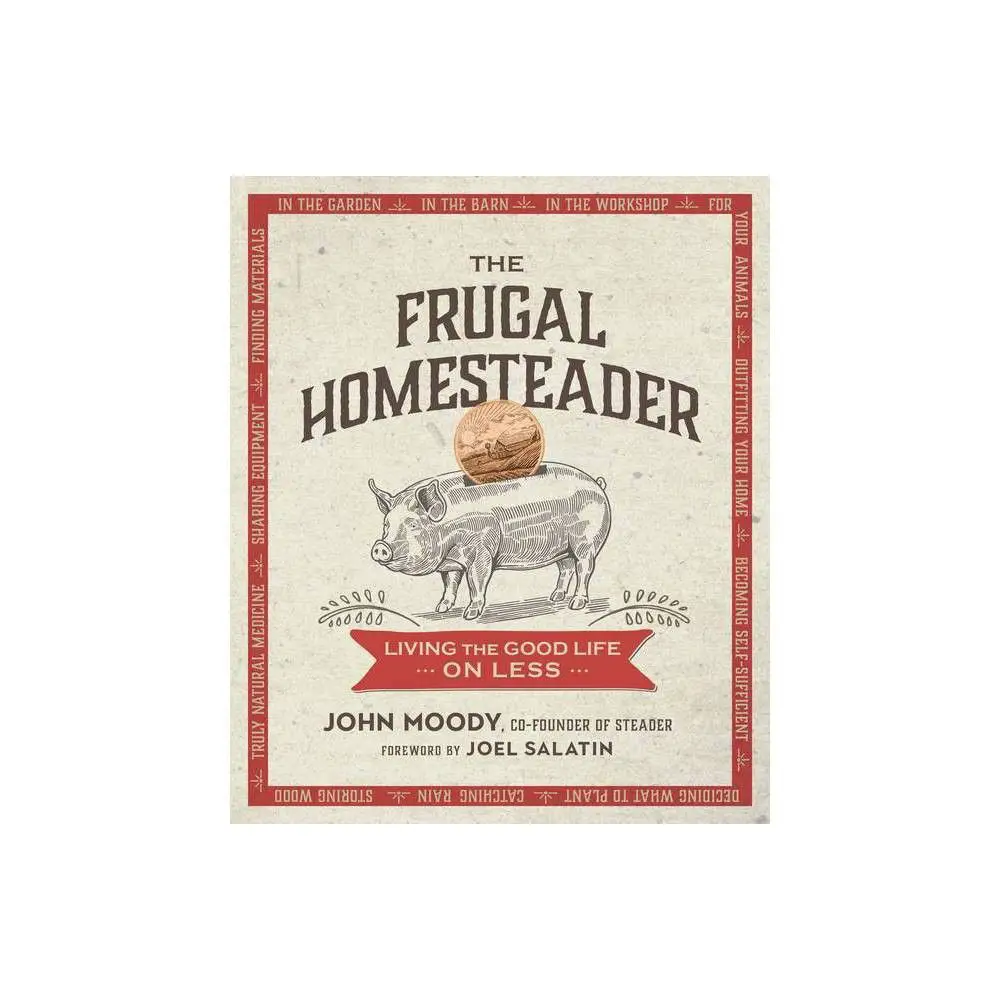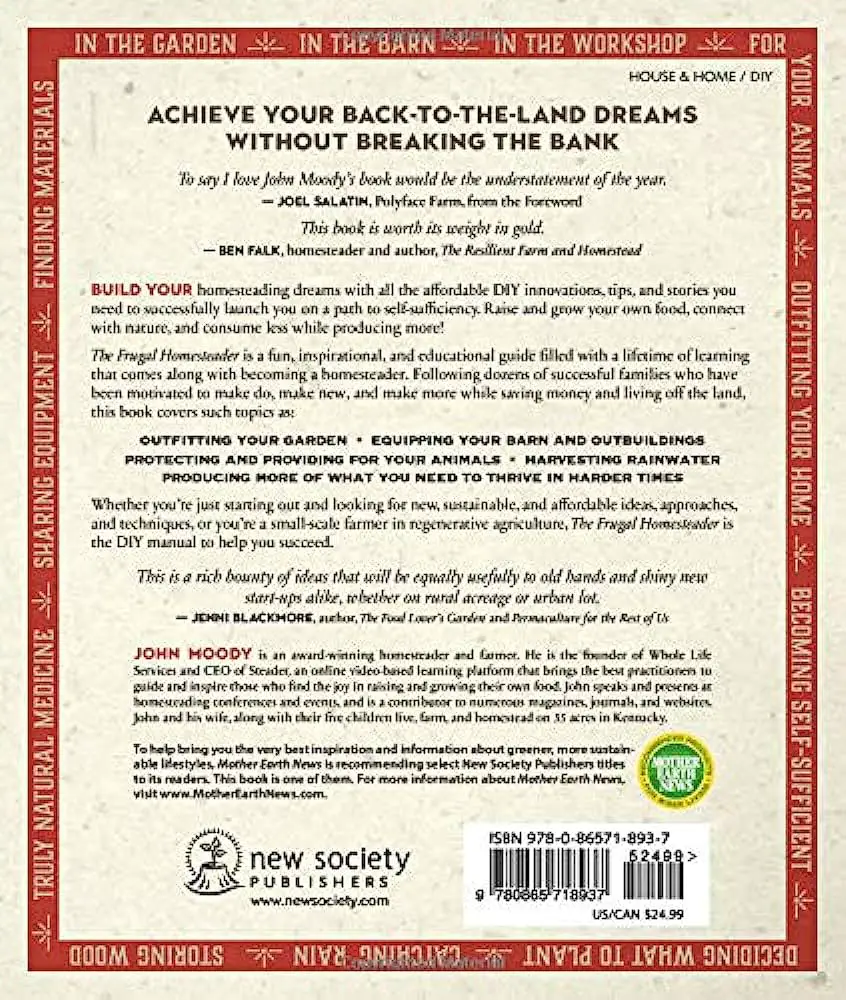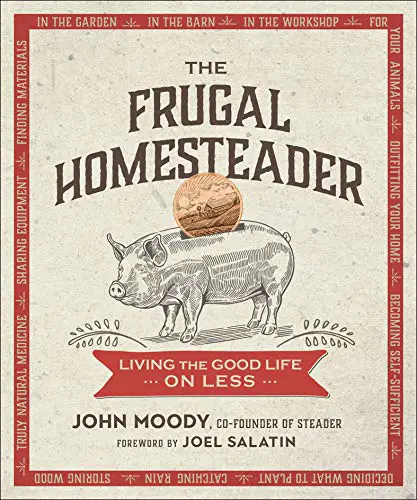Introduction
Welcome to The Frugal Homesteader: How to Save Money Living Off the Land! As someone who is passionate about embracing a frugal lifestyle and finding ways to save money, I created FrugalDude.org to share valuable information and tips with my readers. In this article, I will provide you with a detailed overview of what it means to be a frugal homesteader and the benefits that come with living off the land.
What is a frugal homesteader?
A frugal homesteader is someone who chooses to live a self-sufficient lifestyle by utilizing the resources available on their land. They create a sustainable environment by growing their own food, raising livestock, and using renewable energy sources. By reducing reliance on outside resources, frugal homesteaders are able to save money and build a more resilient lifestyle.
Benefits of living off the land
Living off the land offers numerous benefits beyond just saving money. It promotes a sense of self-sufficiency, allowing individuals to take control of their own food production and reduce their dependency on grocery stores. By growing your own fruits, vegetables, and herbs, you have the power to eat organic, fresh, and nutritious food without the need for pesticides or preservatives.
Furthermore, becoming a frugal homesteader can lead to a greater connection with nature. By cultivating your own garden and tending to your livestock, you develop a deeper appreciation for the natural world and the cycles of life. The physical labor involved in maintaining a homestead can also provide a sense of fulfillment and satisfaction.
Overview of the article
In this article, I will guide you through the various aspects of living off the land as a frugal homesteader. We will explore topics such as planning and setting up a homestead, growing your own food, raising livestock, and utilizing renewable energy sources. Additionally, I will share practical tips and advice on how to save money and make the most out of your homesteading experience.
By the end of this article, you will have a comprehensive understanding of what it takes to become a frugal homesteader and how you can save money by living off the land. So, let’s dive in and embark on this exciting journey together!

The Frugal Homesteader: How to Save Money Living Off the Land
Benefits of Living Off the Land
Living off the land has numerous benefits that not only help save money but also promote self-sufficiency, sustainability, and a healthier lifestyle. Throughout this article, I will delve into the advantages of embracing a frugal homesteader lifestyle.
Reduced expenses and cost savings
One of the primary benefits of living off the land is the significant reduction in expenses. By growing your own food, you can eliminate the need to purchase items from the grocery store, which can be quite costly. Instead, you can rely on the abundance of fresh produce from your homestead, saving a substantial amount of money. Additionally, maintaining your own livestock and producing your own dairy products can further minimize expenses.
Self-sufficiency and sustainability
Another major advantage of living off the land is becoming self-sufficient. When you rely on your own resources, you have control over what you consume and can minimize reliance on outside sources. This independence promotes a sustainable lifestyle by reducing the carbon footprint associated with transportation and packaging of store-bought goods. The sense of accomplishment that comes with producing your own food and resources is immeasurable.
Health and well-being
Living off the land is not only beneficial for your wallet but also for your overall health and well-being. Freshly harvested fruits and vegetables contain higher amounts of vitamins and minerals compared to store-bought produce. The physical labor involved in maintaining a homestead also contributes to improved fitness levels and increased mental well-being. Spending time outdoors, connecting with nature, and being self-sufficient can lead to reduced stress and a greater sense of fulfillment.
adopting a frugal homesteader lifestyle offers a multitude of advantages. From reducing expenses and achieving self-sufficiency to enhancing health and well-being, living off the land can revolutionize the way we live. By embracing this way of life, we not only save money but also contribute to a more sustainable and fulfilling existence. Take a step towards a frugal homesteader lifestyle, and you will reap the rewards of this truly enriching experience.

Planning and Preparation
When it comes to living off the land and saving money, proper planning and preparation are key. Before embarking on your frugal homesteading journey, there are several factors you need to consider to ensure success.
Choosing the right location
Selecting the perfect location for your frugal homestead is crucial. Look for areas with fertile soil, ample water sources, and a favorable climate for growing food. Research local zoning laws and regulations to ensure your plans align with the area’s restrictions. Consider factors such as proximity to grocery stores, schools, and medical facilities as well.
Determining land size and resources
The size of your land will depend on various factors, including your family size, self-sufficiency goals, and budget. Larger plots of land offer more opportunities for growing crops and raising livestock, but they may also require more resources and maintenance. Analyze your resources and assess the amount of space needed for sustainable living, taking into account both the present and future needs of your household.
Creating a budget
Living off the land can be an incredibly cost-effective lifestyle, but it’s essential to establish a budget to ensure financial stability. Consider all the expenses you may incur, such as purchasing land, building infrastructure, acquiring livestock, and purchasing equipment and tools. Factor in ongoing costs such as seeds, feed, and maintenance. By creating a realistic budget, you can track your expenses and make informed financial decisions to save money in the long run.
Embarking on a frugal homesteading lifestyle requires careful planning and preparation. Take the time to choose the right location, determine the appropriate land size, and create a well-designed budget. By doing so, you’ll set a solid foundation for your homestead and increase your chances of saving money while enjoying a self-sufficient and fulfilling lifestyle.

Building Infrastructure
One of the most important aspects of living off the land as a frugal homesteader is building and maintaining the necessary infrastructure. In this section, I will cover the key elements you need to consider and the steps you can take to save money while setting up your homestead.
Setting up a shelter
When it comes to building your shelter, there are various options to suit different budgets and needs. Whether it’s a small cabin, a yurt, or even a converted shipping container, the key is to choose materials that are cost-effective and durable. Consider using reclaimed or salvaged materials for construction to reduce costs while being environmentally conscious. Additionally, by learning basic construction skills and doing the work yourself or with the help of friends and family, you can save a significant amount of money.
Water and sewage systems
Access to clean water is vital for any homesteader. You can save money by installing a rainwater collection system to harvest water for irrigation, livestock, and even household use if properly filtered. Additionally, greywater recycling systems are a great way to reuse water from sinks, showers, and washing machines for irrigation purposes. As for sewage, implementing a composting toilet system can significantly reduce the need for costly septic systems or the frequent pumping of holding tanks.
Energy sources and utilities
To minimize energy costs, consider harnessing renewable energy sources such as solar panels or wind turbines to power your homestead. By investing in these systems upfront, you can save money in the long run by reducing or eliminating electricity bills. Furthermore, implementing energy-efficient appliances and practices, such as using LED light bulbs and conserving electricity, can further reduce your energy expenses.
building a frugal homestead requires careful consideration of infrastructure. By selecting cost-effective materials, implementing water and sewage systems that reduce dependency on outside resources, and prioritizing renewable energy, you can maximize your savings while enjoying a sustainable and self-sufficient lifestyle. Start by establishing a solid foundation with your shelter, and then focus on sustainable water and energy solutions to truly thrive as a frugal homesteader.
Growing Your Own Food
Designing and organizing a garden
As a frugal homesteader, one of the most effective ways to save money is by growing your own food. Not only does it help cut down on grocery bills, but it also ensures that you and your family have access to fresh and nutritious produce. Designing and organizing a garden is an essential first step in this process.
When planning your garden, take into consideration the available space and sunlight. Choose an area that receives at least six hours of direct sunlight daily. It’s also important to determine the size of your garden based on your needs and gardening skills. Start small if you’re a beginner, and gradually expand as you gain more experience.
Choosing the right crops
Selecting the right crops is vital to a successful garden. Consider the climate and growing conditions in your area. Opt for crops that are well-suited to your region and have a higher chance of thriving. Research which vegetables and fruits are known to be hardy and low-maintenance, as this will help save both time and money.
Furthermore, focus on growing crops that your family enjoys and that have a longer shelf life. For example, tomatoes, beans, and potatoes are versatile, easy-to-grow crops that can be preserved through freezing or canning.
Implementing sustainable farming practices
To maximize your savings, adopting sustainable farming practices is crucial. Avoid using chemical-based fertilizers, pesticides, and herbicides. Instead, opt for organic and natural alternatives. Compost kitchen scraps and yard waste to create nutrient-rich soil. Implementing companion planting and crop rotation techniques can also promote healthy plant growth and minimize the risk of pests and diseases.
By designing and organizing your garden thoughtfully, choosing appropriate crops, and implementing sustainable farming practices, you can save money while enjoying the abundant harvest from your own land. Not only will you have a fresh and healthy food supply, but you’ll also have the satisfaction of knowing that you’re reducing your reliance on store-bought produce. So roll up your sleeves, get your hands dirty, and start reaping the benefits of living off the land!

Raising Livestock
Selecting suitable animals
When it comes to being a frugal homesteader, raising livestock can provide a significant source of savings. However, choosing the right animals for your homestead is crucial. Not all animals are suitable or cost-effective for a frugal lifestyle. Consider factors such as the climate in your area, the space available, and your specific goals. For example, If you have limited space, chickens are a great choice as they require minimal area and provide eggs and meat. Goats are also a popular choice as they can provide milk, meat, and help in maintaining your land.
Building shelters and enclosures
Providing suitable shelters and enclosures for your livestock is essential for their well-being and protection. When being frugal, you can look for cost-effective options. For instance, if you have a small number of chickens, you can build a simple yet sturdy chicken coop using recycled materials. For larger animals like goats or pigs, constructing a shelter that combines functionality and cost-efficiency should be the goal. Consider utilizing natural elements like trees for partial shade or building with locally available materials to reduce expenses.
Feeding and healthcare
Feeding your livestock on a budget is possible with careful planning. Growing your own animal feed such as hay, grass, or vegetables can save a significant amount of money. Additionally, consider purchasing feed in bulk or connecting with local farmers for low-cost options. Regular healthcare for your animals is essential, and preventive measures can help avoid costly treatments. Utilize natural remedies when possible or consult with local experts for affordable healthcare options.
As a frugal homesteader, it’s important to carefully select livestock that suits your needs and resources. Building suitable shelters and enclosures using cost-effective materials ensures the comfort and safety of your animals. By planning your livestock’s feed and healthcare needs wisely, you can save money without compromising their well-being. So, go ahead and start raising livestock on your homestead to experience the benefits of a frugal lifestyle.
Preserving and Storing Food
As a frugal homesteader, one of the most important skills to master is preserving and storing food. By utilizing canning and preserving techniques, building a root cellar, and implementing effective food storage strategies, I have been able to save a significant amount of money while living off the land.
Canning and Preserving Techniques
Canning and preserving food is a great way to extend the shelf life of fresh produce. I have found that techniques such as water bath canning, pressure canning, and pickling are not only easy to learn but also cost-effective. By canning and preserving surplus fruits and vegetables, I am able to enjoy homegrown produce throughout the year without having to rely on store-bought alternatives.
Building a Root Cellar
Building a root cellar has been a game changer for me in terms of food storage. With a root cellar, I am able to store a wide variety of vegetables, fruits, and even some dairy products without the need for electricity or refrigeration. By creating a cool and humid environment, a root cellar can help prolong the freshness of perishable items, eliminating waste and ensuring a ready supply of nutritious food throughout the year.
Food Storage Strategies
In addition to canning and building a root cellar, implementing effective food storage strategies is essential for any frugal homesteader. I have found that investing in high-quality containers and storage solutions, such as airtight jars, vacuum sealers, and sturdy pantry shelves, can help me keep food fresh and organized. Additionally, rotating my stockpile regularly ensures that nothing goes to waste and helps me make the most of the resources available on my homestead.
By mastering these techniques and strategies, I have been able to significantly reduce my grocery bill while enjoying the benefits of fresh, homegrown food. Whether you are a seasoned homesteader or just starting on your frugal journey, learning how to preserve and store food efficiently is a valuable skill that will save you money and provide you with a sustainable lifestyle. So roll up your sleeves and get ready to embark on an adventure of self-sufficiency and frugality!
Reducing Waste and Recycling
Composting organic waste
One of the most effective ways that I have found to reduce waste on my homestead is by composting organic waste. Instead of throwing away kitchen scraps and yard trimmings, I have implemented a composting system that turns this waste into nutrient-rich soil. I simply place all my organic waste into a designated compost bin and let nature do the rest. Over time, the waste breaks down and transforms into compost that I can then use to fertilize my garden or nourish my plants. Not only does this help me save money on buying commercial fertilizers, but it also reduces the amount of waste that goes to the landfill.
Reusing and repurposing items
Another way I save money and reduce waste is by reusing and repurposing items. Instead of buying new items, I make a conscious effort to find creative ways to give new life to old objects. For example, I repurpose glass jars as storage containers and use old clothes as rags or to make quilts. This not only helps me save money by avoiding unnecessary purchases, but it also reduces the amount of waste that ends up in landfills.
Implementing a recycling system
In addition to composting and repurposing, I have also implemented a recycling system on my homestead. I have set up designated recycling bins for materials such as glass, plastic, paper, and metal. This allows me to separate recyclable items from general waste and ensure they are properly disposed of. By recycling, I am able to reduce the amount of waste that goes to the landfill and contribute to the conservation of valuable resources.
By actively reducing waste and implementing recycling practices, I have not only saved money but also made a positive impact on the environment. Composting organic waste, reusing and repurposing items, and implementing a recycling system are just a few ways that I have found to live a frugal and sustainable lifestyle on my homestead. These practices have not only allowed me to save money but have also helped me minimize my carbon footprint and contribute to a healthier planet. So why not give it a try yourself and see the benefits firsthand?

Minimizing Expenses
Living off the land is not only a fulfilling way of life, but it can also save you a significant amount of money. As a frugal homesteader, I have discovered various strategies to minimize expenses and make the most of the resources available to me. In this section, I will share with you some valuable insights on frugal shopping and meal planning, utilizing free and low-cost resources, and taking on DIY projects and repairs.
Frugal shopping and meal planning
One of the key ways to save money as a homesteader is by being mindful of your shopping habits. I have found that planning meals in advance and creating a shopping list based on those meals greatly reduces the risk of impulse purchases. By buying in bulk and opting for generic or store-brand items, you can save a substantial amount of money on your grocery bills. Additionally, shopping at local farmers’ markets or growing your own food can significantly cut down on costs while ensuring that you are consuming fresh, organic produce.
Utilizing free and low-cost resources
Living off the land means utilizing the resources that nature provides. This includes harnessing solar power, collecting rainwater, and composting organic waste. By installing solar panels, you can generate your own electricity and dramatically reduce your energy costs. Collecting rainwater not only lowers your water bill but also allows you to water your plants and livestock without relying on the public water supply. Composting is a fantastic way to recycle food scraps and produce nutrient-rich soil for your garden, eliminating the need for expensive fertilizers.
DIY projects and repairs
As a frugal homesteader, I have learned the importance of acquiring some basic DIY skills. By mastering simple repairs and maintenance tasks, I have saved a significant amount of money over the years. From fixing a leaky faucet to building chicken coops, tackling these projects yourself can be not only cost-effective but also rewarding. Many resources, including online tutorials and community workshops, can help you gain the knowledge and confidence to take on these DIY projects.
Living off the land does not mean compromising on quality or convenience. By implementing these strategies, you can save money while enjoying a self-sustaining and fulfilling lifestyle. So why not explore the frugal homesteader within you?
Generating Income
When it comes to living off the land and embracing a frugal lifestyle, finding ways to generate income is essential. While homesteading is primarily about self-sufficiency, there are numerous opportunities to earn money by utilizing the resources available to you. In this section, I will explore some effective methods for generating income as a frugal homesteader.
Selling Homegrown Produce
One of the most obvious ways to earn money as a frugal homesteader is by selling the fruits of your labor – literally. Growing your own produce allows you to not only save money on groceries but also create a surplus that can be sold or traded. Farmers’ markets, local co-ops, and even online platforms provide avenues for selling your homegrown fruits, vegetables, and herbs. By offering fresh, organic, and locally sourced produce, you can attract health-conscious customers and earn a decent income.
Crafting and Selling Homemade Products
In addition to growing your own food, another way to generate income is by crafting and selling homemade products. The options here are endless and can cater to your individual skills and interests. Whether you excel at creating natural beauty products, handcrafted candles, or unique woodwork, there is likely a market for your creations. Online marketplaces, craft fairs, and word-of-mouth referrals can help you reach potential customers and establish a loyal following for your homemade products.
Renting or Leasing Land or Property
If you find yourself with more land or property than you need, consider renting or leasing it to others. This can be an excellent way to generate passive income while helping someone else on their homesteading journey. Whether you have extra garden space for aspiring gardeners or vacant land suitable for livestock grazing, there may be individuals or families willing to pay for access to your resources.
as a frugal homesteader, you have various options for generating income. By selling homegrown produce, crafting and selling homemade products, or renting out your land or property, you can supplement your living expenses and potentially achieve financial sustainability while living off the land. So, embrace your homesteading skills and turn your passion for self-sufficiency into a viable income stream.
Skills and Knowledge
Learning traditional homesteading skills
When it comes to living off the land and adopting a frugal homesteading lifestyle, one of the most crucial aspects is acquiring traditional homesteading skills. These skills can range from food preservation techniques like canning and fermenting, to carpentry, livestock management, and even simple DIY repairs. As a frugal homesteader, I have found that the more skills I possess, the less reliant I am on expensive external services or products. Learning these skills has allowed me to take control of my own self-sufficiency and reduce my expenses significantly.
Acquiring gardening and animal care knowledge
One of the main benefits of living off the land is the ability to grow your own food. Gardening is a fundamental skill for any frugal homesteader. By learning about soil composition, organic pest control methods, companion planting, and crop rotation, I have been able to cultivate a bountiful garden without relying on expensive fertilizers or pesticides. Additionally, acquiring knowledge about animal care is essential for those who want to keep livestock. By learning about proper animal nutrition, shelter construction, and basic veterinary care, I have been able to provide for my animals without constantly needing to consult a veterinarian.
Continual self-education
The path of a frugal homesteader requires a lifelong commitment to learning and self-improvement. Continual self-education is crucial in order to stay updated on the latest techniques, trends, and technologies related to frugal living and sustainable practices. It is important to stay informed about innovations in energy conservation, water management, and alternative farming methods. Personally, I make it a point to regularly attend seminars, workshops, and conferences related to frugal homesteading. Subscribing to relevant publications and joining online forums and communities has also been instrumental in expanding my knowledge and keeping me motivated.
By actively pursuing education and acquiring these skills, I have been able to live a more frugal and self-sustainable lifestyle. With each new skill I learn, I become more empowered to save money and reduce my reliance on external resources. Learning traditional homesteading skills, acquiring gardening and animal care knowledge, and continually educating myself has been the key to my success as a frugal homesteader.
Conclusion
After discussing the various methods and techniques to save money by living off the land, it’s clear that frugal homesteading is a practical and rewarding lifestyle choice. Throughout this article, I have highlighted key points to consider when embarking on a frugal homesteading journey. By growing your own food, raising animals, and reducing your dependence on store-bought goods, you have the potential to significantly cut down on expenses and become more self-sufficient.
Summary of Key Points
First and foremost, establishing a garden is a fundamental step towards frugal homesteading. By growing your own fruits, vegetables, and herbs, you will reduce your grocery bills and have access to fresh, organic produce. Additionally, raising chickens for eggs and cultivating bee hives for honey can provide additional nutritious food sources.
Furthermore, learning to preserve your produce through canning and freezing allows you to enjoy the harvest throughout the year, even during the off-season. This not only saves money but also reduces food waste.
Managing livestock, such as goats, cows, or pigs, can provide a sustainable source of meat, milk, and dairy products. By raising these animals yourself, you can ensure their health and the quality of the products you obtain, while also avoiding the high prices associated with store-bought alternatives.
Encouragement to Start a Frugal Homesteading Journey
Embarking on a frugal homesteading journey can be daunting, but it’s a worthwhile endeavor that offers numerous benefits. Not only can you save money, but you can also lead a more sustainable and self-reliant lifestyle. Start small by establishing a garden or raising a few chickens, and gradually expand your skills and knowledge as you become more comfortable with the process. Don’t be discouraged by setbacks; remember that every step in the right direction is progress.
Final Thoughts
Living off the land to save money not only reduces your ecological footprint but also allows you to reconnect with nature and appreciate the value of self-sufficiency. Embrace the frugal homesteading lifestyle and enjoy the freedom of knowing where your food comes from and the satisfaction of providing for yourself and your loved ones. So why wait? Start your frugal homesteading journey today and experience the joys and benefits it has to offer.
